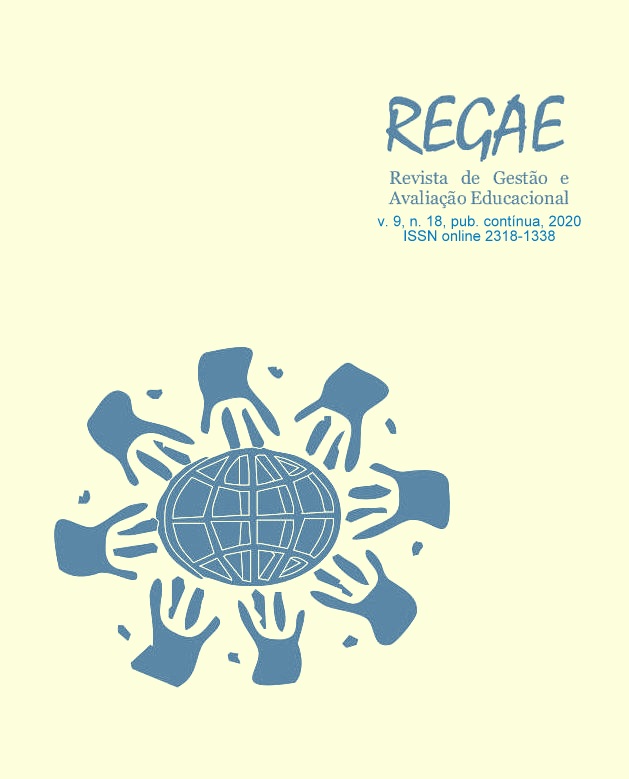The production of the other included in times of large-scale evaluation
DOI:
https://doi.org/10.5902/2318133841486Keywords:
avaliação em larga escala, sujeito, inclusão escolar, currículo.Abstract
The large scale evaluations have become everyday in the educational field. Its purposes are to measure education quality. However, it is understood that such evaluations also produce and qualify the subjects. In Brazil, one of the recent evaluations is the National Literacy Assessment -ANA -, in which we have problematized the way on how the subjects with disabilities have being produced. In this research, the objective was to analyze the production of disabled subjects in public schools based on the National Literacy Assessment. For this purpose, documents that compose and regulate this evaluation were analyzed and interviews were conducted with teachers and principals of public schools in seven counties from Rio Grande do Sul state. Data were analyzed based on Foucaultian Studies. It is noted that ANA contributed to the constitution of the other with disabilities as an incapable and invisible subject to these evaluators.
Key-words: large scale evaluation; subject; school inclusion; curriculum.
Downloads
References
AVELINO, Nildo. Apresentação: Foucault e a anarqueologia dos saberes. In: FOUCAULT, Michel. Do governo dos vivos: curso no Collège de France 1979-1980: excertos. São Paulo: Achiamé, 2011.
FOUCAULT, Michel. Microfísica do poder. Rio de Janeiro: Graal, 1992.
FOUCAULT, Michel. Nascimento da biopolítica. São Paulo: Martins Fontes, 2008.
LOPES, Maura Corcini. A inclusão como ficção moderna. Pedagogia: a revista do curso, São Miguel do Oeste, v. 3, n. 6, 2004, p. 7-20.
LOPES, Maura Corcini. Inclusão escolar, currículo, diferença e identidade. In: LOPES, Maura Corcini, DAL'IGNA, Maria Cláudi (orgs.). In/exclusão nas tramas da escola. Canoas: Ulbra, 2007, p. 11-33.
LOPES, Maura Corcini. Políticas de inclusão e governamentalidade. Educação e Realidade, Porto Alegre, v. 34, n. 2, 2009, p. 153-170.
LOPES, Maura Corcini; FABRIS, Elí Henn. Inclusão e educação. Belo Horizonte: Autêntica, 2013.
VEIGA-NETO, Alfredo. Dominação, violência, poder e educação escolar em tempos de Império. In: RAGO, Margareth; VEIGA-NETO, Alfredo (orgs.). Figuras de Foucault. Belo Horizonte: Autêntica, 2006, p.13-38.
VEIGA-NETO, Alfredo. Crise da modernidade e inovações curriculares: da disciplina para o controle. In: PERES, Eliane et. al (orgs.). Trajetórias e processos de ensinar e aprender: sujeitos, currículos e culturas. Porto Alegre: PUCRS, 2008, p. 35-58.
VEIGA-NETO, Alfredo. Currículo: um desvio à direita ou delírios avaliatórios. COLÓQUIO SOBRE QUESTÕES CURRICULARES, 10, 2012. Anais ... Belo Horizonte: UFMG, 2012.
VEIGA-NETO, Alfredo. Governamentalidades, neoliberalismo e educação. In: BRANCO, Guilherme; VEIGA-NETO, Alfredo (orgs.). Foucault, filosofia e política: Belo Horizonte: Autêntica, 2013, p. 35-50.
VEIGA-NETO, Alfredo. Currículo na Contemporaneidade: internacionalização e contextos locais. COLÓQUIO SOBRE QUESTÕES CURRICULARES, 11, 2012. Anais ... Braga: UMinho, 2014.
VEIGA-NETO, Alfredo; LOPES, Maura Corcini. Inclusão e governamen¬talidade. Educação & Sociedade, Campinas, v. 28, n. 100, 2007, p. 947- 963.
VEIGA-NETO, Alfredo; LOPES, Maura Corcini. Inclusão, exclusão, in/exclusão. In: Verve, n. 20, 2011, p. 121-135.
Downloads
Published
How to Cite
Issue
Section
License
Authors keep copyright and concede to the magazine the right of first publication, with the work simultaneously licensed under the Creative Commons Attribution 4.0 International, non-commercial license with no derivative work, which allows to share the work with no author recognition and initial publication in this magazine.
Authors has authorization to overtake additional contracts separately, to distribute a non-exclusive version of the work published in this magazine: For example: to publish in an institutional repository or as a chapter of a book, with authorial recognition and initial publication in this magazine.
Authors are allowed and are encouraged to publish and distribute their work online. For example: in institutional repositories or in their own personal page – at any point before or during the editorial process, because this can result in productive changes, as well as increase the impact and the mention to the published work.






